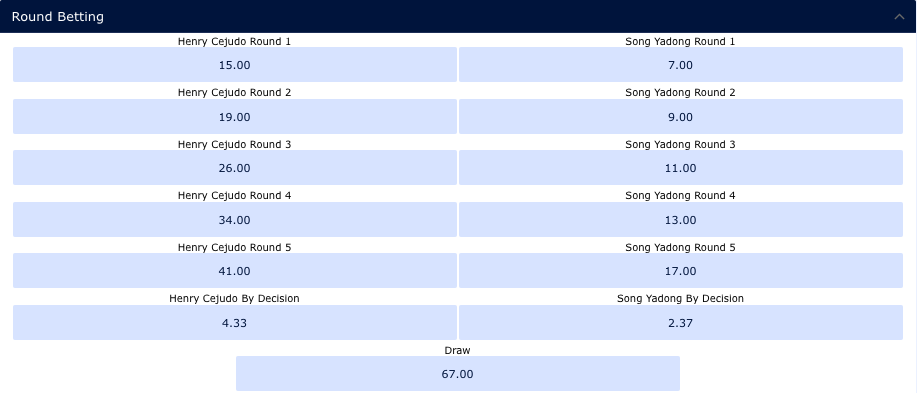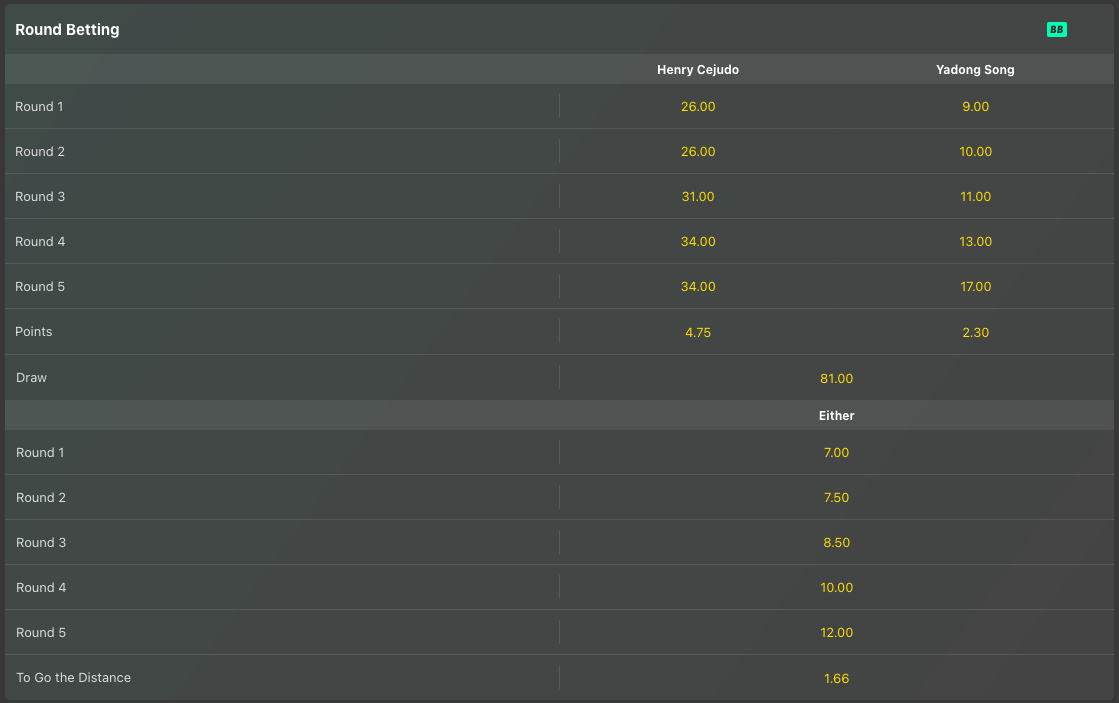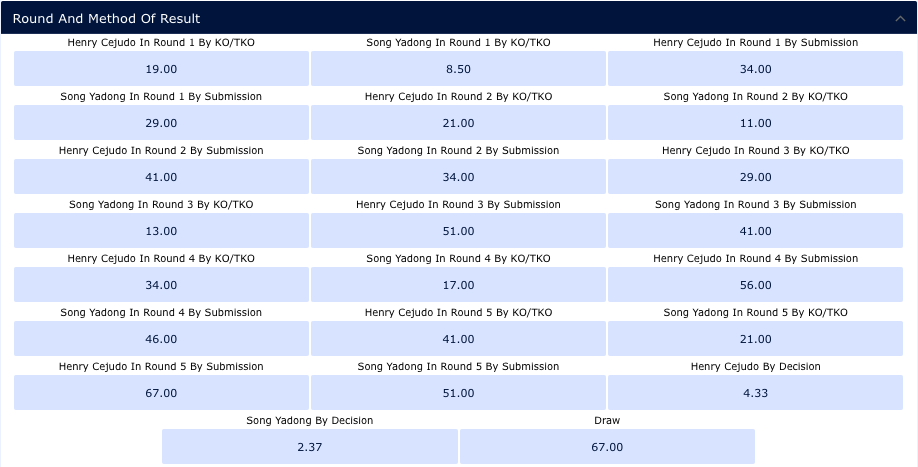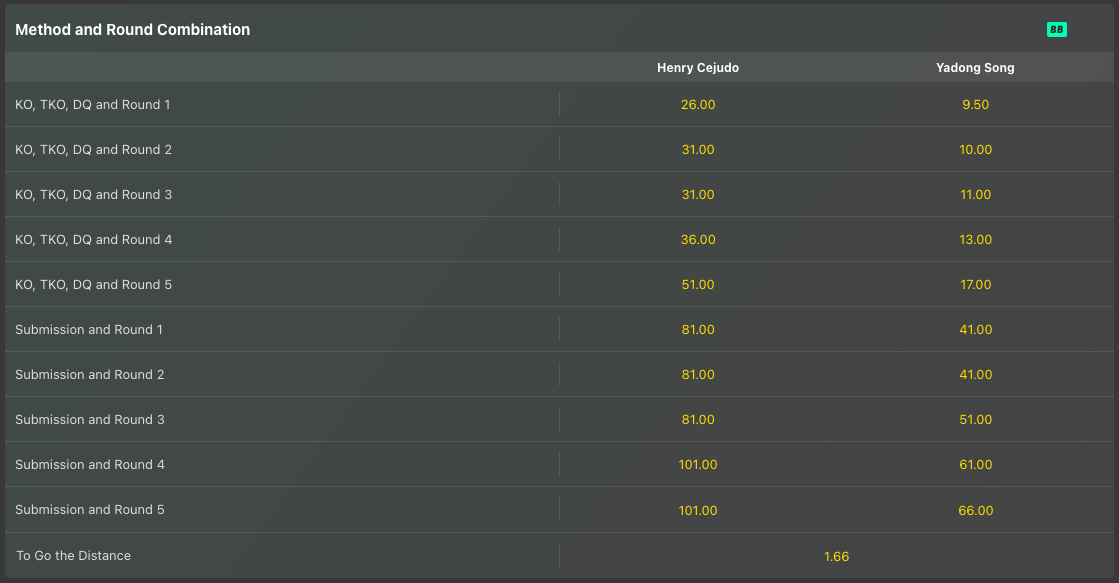UFC Odds Explained: Comprehensive Guide
UFC (Ultimate Fighting Championship) is an American MMA (Mixed Martial Arts) organisation. In the sport, competitors from around the world compete in the Octagon, vying for the top spot in their weight category and the coveted UFC Championship belt.
With the increasing popularity of the sport, bookmakers have been keen to get in on the action, offering betting markets for both UFC and other MMA events.
In this guide, we’ll look at the different betting markets available in UFC and other MMA events, and see how the betting odds work.
What Is UFC?
Mixed Martial Arts (MMA) has a rich and fascinating history, from Ancient China’s Leitai to Brazil’s no-holds-barred Vale Tudo and Bruce Lee’s Jeet Kune Do.
In November 1993, Brazilian Rorion Gracie teamed up with businessman Art Davie to create the Ultimate Fighting Championship (UFC). Rorion Gracie is a member of the highly influential Gracie family of martial artists, who developed Gracie jiu-jitsu (now known as Brazilian jiu-jitsu).
The rules and format of UFC have evolved over time, with bouts now taking place in an octagonal caged arena, appropriately named ‘The Octagon’. The bouts are broken down into 5-minute rounds. Non-title fights last up to three rounds but title fights can be up to five rounds.
Fighters use striking techniques, with both arms and legs, as well as grapples, throws, sweeps, takedowns, and holds.
Fights can be won by knockout, technical knockout, submission, technical submission, or decision.
Betting Odds
Betting odds show how much you win if your bet is successful
Betting odds also show how likely an outcome is to occur, with high odds indicating outcomes that are not likely to occur and low odds indicating more likely outcomes.
Although high-odds bets are less likely to win, your payout will be larger than for a low-odds bet if it wins.
There are three types of odds used in betting:
- Fractional Odds
- Decimal Odds
- American Odds
Outplayed have a great tool if you need to convert from one odds format to another, which you can find here.
Types of Odds
Fractional Odds
Fractional odds are expressed as a ratio of the profit on a winning bet to the stake
Also known as British odds, Fractional odds are mostly used in the UK and Ireland.
Examples:
- 3/1 odds - £3 profit for every £1 staked. Equivalent to 4.0 in decimal odds and +300 in American odds.
- 5/2 odds - £5 profit for every £2 staked. Equivalent to 3.5 in decimal odds and +250 in American odds.
- 1/2 odds - £1 profit for every £2 staked. Equivalent to 1.5 in decimal odds and -200 in American odds.
Decimal Odds
Decimal odds show how many times higher the return is than the original stake
Decimal odds are also called European odds. Despite the name, they’re worldwide and are the dominant odds format in all countries other than the UK, Ireland, and the USA.
Matched Betting uses decimal odds since they’re used by all betting exchanges, and they’re easier to work with mathematically than the other odds formats.
They’re also arguably the easiest odds format to understand.
Unlike fractional odds, decimal odds include the original stake when calculating. To work out your return on a winning bet (including stake), multiply your stake by the decimal odds.
Examples:
- 3.0 odds - £3.00 return (including stake) from a £1 bet. Equivalent to 2/1 in fractional odds and +200 in American odds.
- 4.5 odds - £4.50 return (including stake) from a £1 bet. Equivalent to 7/2 in fractional odds and +350 in American odds.
- 1.8 odds - £1.80 return (including stake) from a £1 bet. Equivalent to 4/5 in fractional odds and -125 in American odds.
American Odds
American odds are also called Moneyline odds. They’re pretty much exclusively used in the USA and are probably the most confusing to non-Americans.
One tricky aspect of American odds is that positive odds are used for outsiders and negative odds for favourites. Due to how they work, the number after the + or - sign is always 100 or higher.
Positive American Odds
Positive odds are used for outsiders/longshots. They show the profit on a £100 stake if the bet wins.
Negative American Odds
Negative odds are used for favourites. They show how much you have to stake to make a profit of £100.
Examples:
- +100 odds - Bet £100 to make £100 profit. Equivalent to 2.0 in decimal odds and 1/1 (evens) in fractional odds.
- +450 odds - Bet £100 to make £450 profit. Equivalent to 5.5 in decimal odds and 9/2 in fractional odds.
- -250 odds - Bet £250 to make £100 profit. Equivalent to 1.4 in decimal odds and 2/5 in fractional odds.
Incidentally, +100 and -100 odds are the same.
Betting Odds And Implied Probability
Implied probability shows how likely an outcome is, as implied by the odds
It’s easiest to work out implied probability from decimal odds. The implied probability formula is:
Implied Probability = 1 ÷ Decimal Odds
This gives the implied probability as a decimal. Multiply by 100 if you want this expressed as a percentage.
A simple and intuitive example is a bet at odds of 2.0, which is 1/1 (evens) in fractional odds. The implied probability for these odds is:
Implied Probability = 1 ÷ 2 = 0.5 = 50%
If they’re fair odds, you have a 50% chance of the bet winning. With a £1 stake, you’ll make a £1 profit half the time and lose £1 the other half. In the long run, you and the bookmaker will both break even.
Since bookmakers won’t make any profit if they only break even on their bets, they don’t use fair odds.
How Bookmakers Set Their Odds
The first step that bookmakers make when setting betting odds is to work out how likely they think an outcome is to occur.
There are very few situations when the true likelihood of an outcome is known, but tossing a fair coin is one of them. There’s a 50% chance of the coin landing on either heads or tails.
Bookmakers sometimes offer odds for a coin toss, for example at the start of a cricket game.
Fair odds for an outcome with a 50% chance of occurring are 2.0 in decimal.
However, this would mean the bookmaker would break even in the long term.
To ensure they make long-term profits, bookmakers factor a margin into their markets by lowering the odds compared to fair odds. For a coin toss, they might drop the odds for either heads or tails from 2.0 to 1.9.
If a bettor places a £100 bet on heads at odds of 1.9, there’s a 50% chance the bookmaker will gain £100 from a losing bet and a 50% chance they’ll have to pay out £90. This discrepancy means the bookmaker will make long-term profits from their coin toss market.
You can discover more about how bookmakers set their odds, and how you can make long-term profits from value betting by taking advantage of mispriced odds here.
Which UFC Betting Markets Are Available?
Unlike football and many other sports, the range of betting options for UFC is relatively sparse. Often, you’ll find you can only bet on the match winner. However, some bookmakers offer more markets, especially for high-profile events like title fights.
In this section, you’ll find some of the markets you might see in UFC betting.
Match Winner
As the name suggests, this market allows you to bet on who will win the fight. The market might have another name, including Fight Winner, To Win Fight, or Bout Betting.
Here’s the ‘Fight Winner’ market on Kwiff:

And here’s William Hill’s ‘Bout Betting’ market:

Bet365 list the market as ‘To Win Fight’:

All bookmakers that have fights listed will offer the match result market.
Over/Under Rounds
Also called Total Rounds, in this market you’re betting on whether there will be more or fewer than a certain number of rounds. This number of rounds normally ends in .5 to make it a two-way market.
Here’s the market on Kwiff:

William Hill also has the market:

Method Of Result
Here, you’re betting on who will win and the method of their win, or if it will be a draw.
Bookmakers tend to offer bets covering several methods of victory for each fighter. For example, in this William Hill market, you can bet on either fighter to win ‘by KO/TKO/DQ or Submission’ as one bet and to win ‘by Decision’ with another:

They also have an ‘Alternative Method Of Result’ market. This has the same ‘By Decision’ and ‘Draw’ markets, but separates ‘By Submission’ from the other victory methods:

Bet365 have the same options as this for their main ‘Method of Victory’ market. Their ‘By Decision or Technical Decision’ market explicitly mentions that technical decisions are included in the bet. William Hill’s market only mentions ‘By Decision’, but this will still include technical decisions:

Bet365 also have a ‘Method of Victory Double Chance market’, giving more options for the range of winning methods you can cover with one bet:

Decision Result
This is a bet on the type of decision that will settle the match. Here’s the bet on William Hill:

If the fight doesn’t go the distance (i.e. is settled by a knockout, technical knockout, disqualification, or submission), all of these bets will lose.
This market doesn’t cover all possible outcomes, since you can’t bet on there not being a decision in the bout. However, there is a separate ‘Fight to go the Distance’ market on William Hill.
Decision No Bet
In this market, you’re betting on which of the fighters will win inside the allotted time of the bout. If the fight goes to a decision after all rounds are completed, all bets on the market are void, and you’ll have your stake refunded.

Round Betting
With ‘Round Betting’, you’re betting on who will win the bout, and in which round, or if they’ll win by decision. There’s also a ‘Draw’ option, although draws are very rare in UFC.
Here’s the market on William Hill:

Bet365 has the same market and also gives you the option to bet on either of the fighters to win in a particular round:

Round And Method Of Result
This market allows you to bet on who will win, in which round, and by what method. The odds tend to be high for this bet, since you need several different outcomes to occur for your bet to win. The exceptions are the ‘By Decision’ options.
Here’s the market on William Hill:

William Hill’s terms regarding disqualification aren’t particularly clear, but if a fighter is disqualified, it appears that the other fighter might be awarded a win by KO/TKO in the round that the disqualification occurred. However, disqualifications in UFC are rare.
Bet365 have the same market, and more helpfully includes disqualification (DQ) in the bet:

Fight To Go The Distance
This is simply a bet on whether the fight will go the full distance and to the judges' decision, rather than being settled by some kind of knockout, submission, or disqualification.

How Will The Fight End
This allows you to bet on how the fight will be decided, without specifying which fighter is victorious.

Example UFC Bet
In this ‘Bout Betting’ market between Andre Fill and Melquizael Costa, the odds make it clear that the fighters are thought to be very evenly matched:

The odds also show the bookmaker’s edge, as mentioned previously, since fair odds would be 2.0 for each fighter.
If you place a £20 bet on Andre Fill to win and it wins, your return, including stake, will be:
Return = £20 x 1.91 = £38.20
Your profit doesn't include your initial stake, so this will be:
Profit = £38.20 - £20 = £18.20
If your Andre Fill doesn’t win, you’ll lose your £20 stake.
Where To Bet On UFC
Most bookmakers list UFC and sometimes other MMA fights. However, the range of available markets differs significantly between them.
Often, you’ll only see the ‘Match Result’ market listed and perhaps also the ‘Over/Under Rounds’ market.
A handful of bookmakers have more markets available. Sometimes, you’ll find they have more markets for higher-profile fights.
The following bookmakers are a good choice if you want plenty of markets to choose from:
Using UFC For Matched Betting
Matched Betting is a great way to make an additional income from home. Many Sportsbook Sign Up Offers allow you to bet on all sports, so you can choose a UFC bet if you want to.
However, Outplayed generally suggest betting on either football or horse racing for qualifying offers, since it’s easier to understand, more popular, and you can find these bets using Outplayed’s superb Oddsmatching tool.
Bookmakers sometimes have reload offers for high-profile UFC fights. For these, unless the offer states a specific market, you’re often best to bet on the match winner market. One reason is that it’s the most popular market and betting exchanges will always have the market if they list the fight.
Summary
UFC has seen a surge in popularity in recent years, from its roots as a niche sport into more mainstream success. Bookmakers have been keen to get in on the action, and most have UFC/MMA sections in their sportsbook.
The markets available vary considerably from one bookmaker to the next, but there are plenty of options, particularly for high profile events like title fights.
If you’re Matched Betting, you’re more likely to bet on other sports like football, horse racing, golf, tennis, or basketball, rather than UFC. However, some bookmakers run worthwhile offers for high-profile UFC title bouts, so having an insight into UFC betting is helpful.
To find out more about Matched Betting, make sure you check out Outplayed’s free trial. This gives you access to all of the sportsbook sign-up offers, which are worth around £800, as well as a handful of casino offers so you can have a go at these too.
Updated: 9 Sep 2025
The Author
Simon has helped thousands of members profit from Matched Betting using both his passion for writing and desire to understand how things work. He has used his mathematical and analytical skills to create several guides, calculators, betting and casino tools to make the process of Matched Betting easier for newcomers and experienced members alike.

